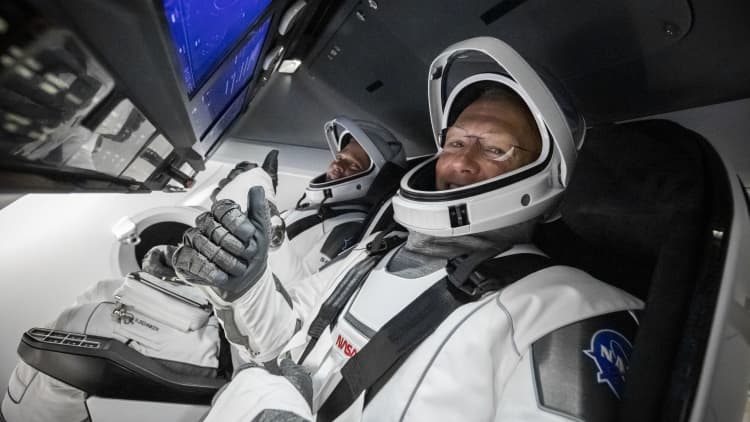[The livestream started at 8:15 a.m. ET. Please refresh the page if you do not see the video player above.]
Boeing‘s first Starliner flight with astronauts on board was called off in the final minutes on Saturday. The cause of the launch delay was not immediately announced.
The company was targeting a launch on June 1 at 12:25 p.m. ET of its capsule, which is carrying astronauts to the International Space Station for the first time in a final major test of the system.
Two NASA astronauts are aboard the Starliner capsule, which would be carried by United Launch Alliance’s Atlas V rocket to the International Space Station.
Boeing already has backup launch dates scheduled, including Sunday at 12:03 p.m. EDT. Depending on the cause of the launch scrub, Boeing and NASA can reschedule the launch for another attempt 24 hours later, or target alternative launch dates of June 5th or June 6th.
NASA and Boeing called off a launch attempt in early May due to an issue detected with the rocket. ULA, a joint venture of Boeing and Lockheed Martin, replaced the rocket’s problematic valve.
After calling off the May attempt, NASA and Boeing found a “small” helium leak in Starliner, causing the agency and company to perform another series of assessments. After analysis, NASA and Boeing believe the source of the leak is in the spacecraft’s helium propulsion system. But officials said last week that the leak is “stable” and “not a safety of flight issue.”
Boeing’s Starliner spacecraft atop the United Launch Alliance Atlas V rocket rolls out in Florida on Thursday, May 30, 2024.
Isaac Watson | NASA
The astronauts
NASA astronauts Butch Wilmore, left, and Suni Williams.
Credit: Kim Shiflett | NASA
Butch Wilmore and Suni Williams are flying on Starliner, with the former serving as the spacecraft’s commander and the latter as its pilot.
Wilmore joined NASA in 2000 and has flown to space twice previously on the Space Shuttle and Russia’s Soyuz. Before NASA, Wilmore was a U.S. Navy pilot.
Williams was selected by NASA in 1998 and has also flown to space twice before, on the Space Shuttle and then the Soyuz. Williams was also a Navy pilot like Wilmore before joining the space agency.
The rocket and capsule
Boeing’s Starliner spacecraft atop the United Launch Alliance Atlas V rocket is seen on the launch pad of Space Launch Complex-41 at Cape Canaveral Space Force Station in Florida on Thursday, May 30, 2024.
Isaac Watson | NASA
Starliner launches on ULA’s Atlas V. The rocket debuted in 2002, and the Starliner crew flight test represents its 100th launch.
The capsule itself is built to carry as many as four NASA astronauts per flight and more than 200 pounds of research and cargo. The spacecraft lands using a parachute and airbag system. Starliner is reusable, with each capsule designed to fly as many as 10 missions.
The mission
Boeing’s crew flight test aims to certify the Starliner system as capable of carrying NASA astronauts to and from the ISS.
If Starliner launches on Saturday, it will fly in space for about 25 hours before a planned docking with the International Space Station at 1:50 p.m. on Sunday. The astronauts will then spend about a week on the ISS, focused on testing Starliner, before returning to Earth.

